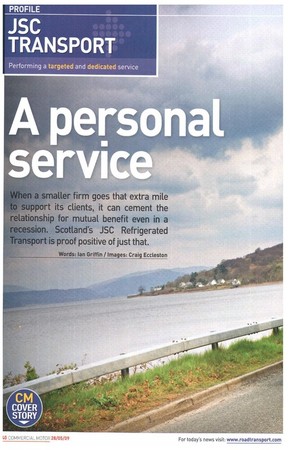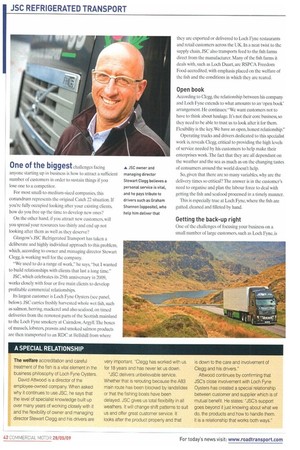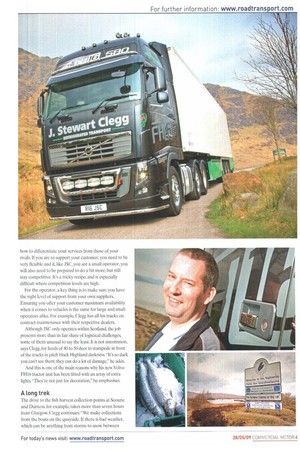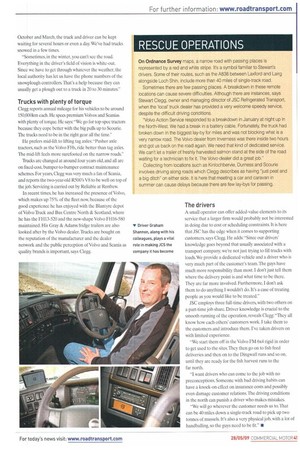When a smatter firm goes that extra mile to support
Page 40

Page 42

Page 43

Page 45

If you've noticed an error in this article please click here to report it so we can fix it.
its clients, it can cement the relationship for mutual benefit even in a recession. Scotland's JSC Refrigerated ransport is proof positive of just that.
Words: Ian Griffin / Images: Craig Ealeston One of the biggest challenges facing anyone starting up in business is how to attract a sufficient number of customers in order to sustain things if you lose one to a competitor.
For most small-to-medium-sized companies, this conundrum represents the original Catch 22 situation. If you're fully occupied looking after your existing clients, how do you free up the time to develop new ones?
On the other hand, if you attract new customers, will you spread your resources too thinly and end up not looking after them as well as they deserve?
Glasgow's JSC Refrigerated Transport has taken a deliberate and highly individual approach to this problem, which, according to owner and managing director Stewart Clegg, is working well for the company.
"We used to do a range of work," he says,"but I wanted to build relationships with clients that last a long time."
JSC, which celebrates its 25th anniversary in 2009, works closely with four or five main clients to develop profitable commercial relationships.
Its largest customer is Loch Fyne Oysters (see panel, below). JSC carries freshly harvested whole wet fish, such as salmon, herring, mackerel and also seafood, on timed deliveries from the remotest parts of the Scottish mainland to the Loch Fyne smokery at Caimdow,Argyll.The boxes of mussels, lobsters, prawns and smoked salmon products are then transported to an RDC at Bellshill from where they are exported or delivered to Loch Fyne restaurants and retail customers across the UK. In a neat twist to the supply chain, JSC also transports feed to the fish farms direct from the manufacturer. Many of the fish farms it deals with, such as Loch Duart, are RSPCA Freedom Food-accredited, with emphasis placed on the welfare of the fish and the conditions in which they are reared.
Open book
According to Clegg, the relationship between his company and Loch Fyne extends to what amounts to an 'open book' arrangement. He continues: "We want customers not to have to think about haulage. It's not their core business, so they need to be able to trust us to look after it for them. Flexibility is the key. We have an open, honest relationship."
Operating trucks and drivers dedicated to this specialist work is, reveals Clegg, critical to providing the high levels of service needed by his customers to help make their enterprises work. The fact that they are all dependant on the weather and the sea as much as on the changing tastes of consumers around the world doesn't help.
So, given that there are so many variables, why are the delivery times so critical? The answer is in the customer's need to organise and plan the labour force to deal with getting the fish and seafood processed in a timely manner.
This is especially true at Loch Fyne, where the fish are gutted, cleaned and filleted by hand.
Getting the back-up right
One of the challenges of focusing your business on a small number of large customers, such as Loch Fyne, is how to differentiate your services from those of your rivals. If you are to support your customer, you need to be very flexible and if, like J SC, you are a small operator, you will also need to be prepared to do a bit more, but still stay competitive. It's a tricky recipe, and is especially difficult where competition levels are high.
For the operator, a key thing is to make sure you have the right level of support from your own suppliers. Ensuring you offer your customer maximum availability when it comes to vehicles is the same for large and small operators alike. For example, Clegg has all his trucks on contract maintenance with their respective dealers.
Although JSC only operates within Scotland, the job presents more than its fair share of logistical challenges, some of them unusual to say the least. It is not uncommon, says Clegg, for herds of 40 to 50 deer to stampede in front of the trucks in pitch black Highland darkness. "it's so dark you can't see them; they can do a lot of damage," he adds.
And this is one of the main reasons why his new Volvo FH16 tractor unit has been fitted with an array of extra lights."They're not just for decoration," he emphasises.
A tong trek
The drive to the fish harvest collection points at Scourie and Durness, for example, takes more than seven hours from Glasgow. Clegg continues: "We make collections from the boats on the quayside. If there is bad weather, which can be anything from storms to snow between October and March, the truck and driver can be kept waiting for several hours or even a day. We've had trucks snowed in a few times -Sometimes, in the winter, you can't see the road. Everything in the driver's field of vision is white-out. Since we have to get through whatever the weather, the local authority has let us have the phone numbers of the snowplough controllers That's a help because they can usually get a plough out to a truck in 20 to 30 minutes."
Trucks with plenty of torque Clegg reports annual mileage for his vehicles to he around 150.000km each. He specs premium Volvos and Scanias with plenty of torque. He says: "We go for top-spec tractors because they cope better with the big pulls up to Scourie. The trucks need to be in the right gear all the time."
He prefers mid-lift to lifting tag axles: "Pusher axle tractors, such as the Volvo FHs, ride better than tag axles The mid-lift feels more surefooted on the narrow roads."
Trucks are changed at around four years old, and all are on fixed-cost, bumper-to-bumper contract maintenance schemes For years, Clegg was very much a fan of Scania, and reports the two-year-old R500's V8 to be well on top of the job. Servicing is carried out by Reliable at Renfrew.
In recent times, he has increased the presence of Volvo, which makes up 75% of the fleet now, because of the good experience he has enjoyed with the Blantyre depot of Volvo Truck and Bus Centre North & Scotland, where he has the FH13-520 and the new-shape Volvo FH16-580 maintained. His Gray & Adams fridge trailers are also looked after by the Volvo dealer. Trucks are bought on the reputation of the manufacturer and the dealer network and the public perception of Volvo and Scania as quality brands is important, says Clegg. The drivers A small operator can offer added-value elements to its service that a larger firm would probably not be interested in doing due to cost or scheduling constraints. It is here that JSC has the edge when it comes to supporting customers, says Clegg. He adds: "Since our drivers' knowledge goes beyond that usually associated with a transport company, we're not just trying to fill trucks with loads. We provide a dedicated vehicle and a driver who is very much part of the customer's team.The guys have much more responsibility than most.! don't just tell them where the delivery point is and what time to be there. They arc far more involved. Furthermore. I don't ask them to do anything I wouldn't do. It's a case of treating people as you would like to be treated."
JSC employs three full-time drivers, with two others on a part-time job share. Driver knowledge is crucial to the smooth running of the operation, reveals Clegg: "They all know how each others' customers work. I take them to the customers and introduce them. I've taken drivers on with limited experience.
"We start them off in the Volvo FM 6x4 rigid in order to get used to the sites. They then go on to fish feed deliveries and then on to the Dingwall runs and so on, until they are ready for the fish harvest runs to the far north.
"I want drivers who can come to the job with no preconceptions. Someone with bad driving habits can have a knock-on effect on insurance costs and possibly even damage customer relations The driving conditions in the north can punish a driver who makes mistakes "We will go wherever the customer needs us to. That can be 40 miles down a single-track road to pick up two tonnes of mussels. It's also a very physical job. with a lot of handballing, so the guys need to be fit." III








































































































































